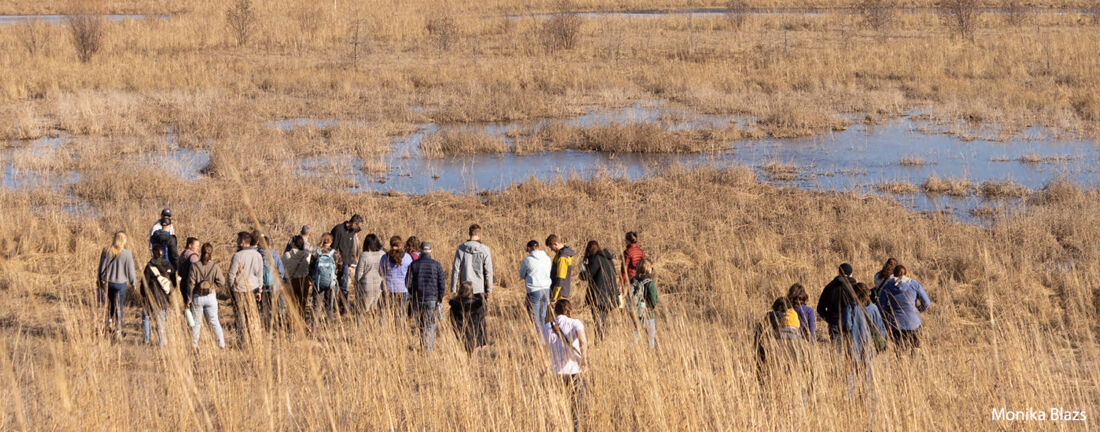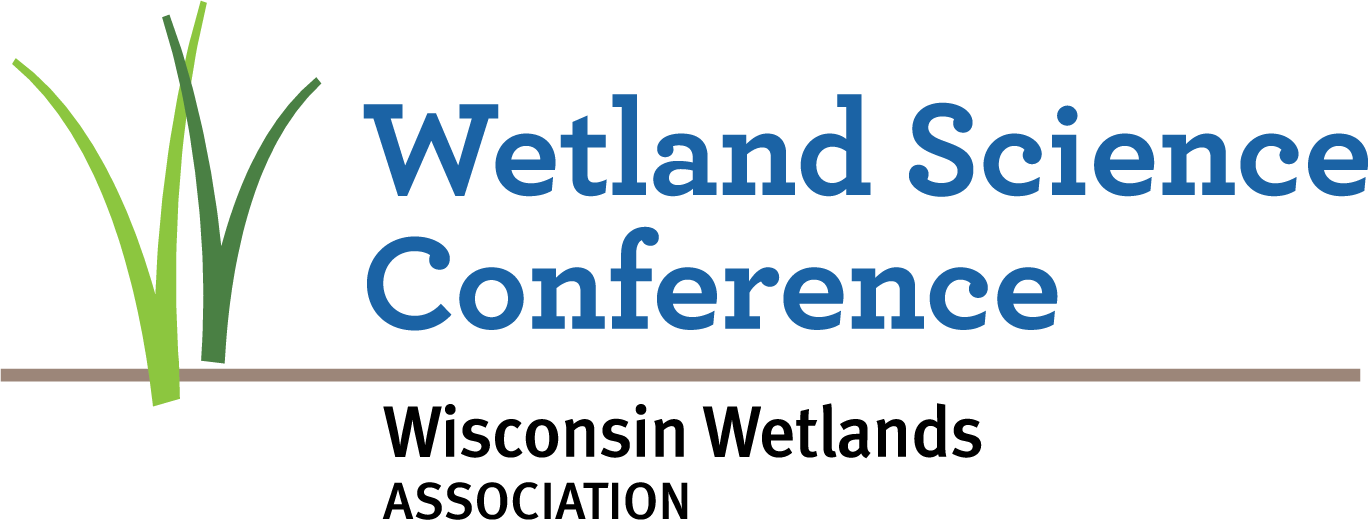
Field trips
These trips are your chance to view and enjoy the natural resources we work to protect, manage, and restore. Pre-registration for field trips is required and will include a nominal fee. Field trip sign-up will occur when you register for the conference. Space in each field trip is limited, and sign-up is first-come-first-served, so register early to ensure you get into your desired field trip. Note that field trip fees are non-refundable.
**Please note that the field trips will go in almost any weather (with the exception of hazardous conditions). We’ve encountered a wide range of conditions on our February field trips, so please consider this as you decide between indoor and outdoor options, and be prepared to dress warmly if you do register for an outdoor field trip.
Tuesday, February 24, 2026: 1:30-4:30 pm
Aldo Leopold Foundation Pines property: 30 years in the making, a wetland restoration’s story and future
Day & Time: Tuesday, February 24, 2026, 1:30 – 4:30 pm
Registration Fee: $15.00
Leaders: Carl Cotter (Riverside Farms); Peter Ziegler (Wisconsin Waterfowl Association); Steve Swenson, Kate Singer, and Caitlin McWilliams (The Aldo Leopold Foundation)
Description: Riverside Farms, owned by the Pines family, is not only a working farm but also a conservation hub that features prairie, floodplain forest and wetland restorations. This tour will focus on the recent and upcoming wetland restoration activities that have taken well over 30 years to come to fruition. We’ll share the site’s history, conflicts both personal and political, Swampbuster violations, the restoration process, and the current plan for the future restoration.
The Pines wetland restoration site is located approximately 0.5 miles north of the Wisconsin River in Columbia County. In total, it encompasses 180 acres of a floodplain wetland complex where both surface and groundwater systems are present. Over the past century, the area has been used for various agricultural practices. While no crops have been raised in recent history, the entire region had been ditched, drained, and plowed over and to this day there is an active pasture and hayfield located within the restoration area.
The landscape pocketed with wetland plants, the hydric soils, and the location within the Wisconsin River floodplain all indicate that this region was once dominated by a wetland community. The hydrology of region is severely altered by the many ditches around the restoration area. Both groundwater and surface water systems that influence the hydrology of the site.
Join us as we go in depth about the site’s history, previous restoration actions taken, and the next wave of restoration actions that are currently being planned.
Participant Considerations: This is an outdoor field trip. Come dressed for the weather of the day, which will likely include cold weather gear, and be prepared to walk up to two miles.
Tour Leader Biographies
Peter Ziegler – Primary Leader
Peter is Director of Habitat for Wisconsin Waterfowl Association with more than 20 years working in the habitat restoration field across the upper Midwest. He completes property analysis, technical work, permitting, and cost share associated with habitat restoration projects across the state for private landowners, non-profits, governmental agencies, and commercial businesses.
Carl Cotter – Primary Leader
Carl is the Land Manager at Riverside Farms, a 2,200 acre privately owned conservation property and working farm. Previously, Carl worked at The Aldo Leopold Foundation as the Land Stewardship Coordinator and has helped manage land for more than a decade. Carl’s land management techniques emphasize using prescribed disturbances like fire, grazing, forestry mowing, and timber stand improvements.
Steve Swenson – Co-Leader
For more than 20 years, Steve has been advancing the ethical relationship between people and land through tangible conservation initiatives. As Program Director, he oversees the foundation’s marketing, communications, facilities, education and outreach, and land stewardship staff. Steve’s facilitation of staff time and talents focuses on the foundation’s ambition to grow budget and impact.
Caitlin McWilliams – Co-Leader
Caitlin is a Land Stewardship Fellow with the Aldo Leopold Foundation. She is from southeastern Minnesota, where helping care for a remnant prairie on her family’s land sparked her love for restoration work. She recently graduated from Carleton College, where she led sustainability initiatives through the campus environmental club and consulted on geospatial projects as a GIS Lab Assistant.
Kate Singer – Co-Leader
Kate is a Land Stewardship Fellow with the Aldo Leopold Foundation. She recently graduated from Dartmouth, where she double majored in Biology and Environmental Studies with a minor in Native American and Indigenous Studies. Kate has a passion for ethical and intentional stewardship and recreation and looks forward to inspiring others to develop a land ethic of their own!
Aldo Leopold Foundation shack & farm: Floodplain restoration and landscape management
Day & Time: Tuesday, February 24, 2026, 1:30 – 4:30 pm
Registration Fee: $15.00
Leaders: Arik Duhr, Mitchell Groenhof, Eric Snyder, Gracie Corral, and Emily Johnson (The Aldo Leopold Foundation)
Description: Aldo Leopold was a conservationist, writer, philosopher, educator, outdoor enthusiast, and one of the original leaders in the field of wildlife ecology. He is best known as the author of A Sand County Almanac, but during his sweeping career, Leopold also affected nearly every national conservation initiative of the 1930s and 1940s. On this tour, you will hear stories from his prestigious career, learn about pioneering restoration work initiated by Leopold and his family, experience the inside of the National Historic Landmark, and stroll through restored prairie and woods along the Wisconsin River. Connect with the stories you’ve read from A Sand County Almanac as you learn about the importance of the preserve.
We’ll also hike through a restored floodplain forest along the Wisconsin River just west of the Shack. A large-scale timber harvest of 167 acres took place in 2015 to create more suitable habitat for grassland and savanna birds by removing vertical barriers and increasing habitat connectivity. We’ll discuss the planning process, preparation, implementation, post-harvest actions and the continued management of such a large-scale disturbance upon a floodplain ecosystem.
As The Aldo Leopold Foundations strives to be a model for others in conservation, we’ll share how this floodplain savanna project demonstrates to others the scale and scope of management actions necessary to accomplish meaningful conservation impact. With a strong foundation in data, careful planning, well-managed execution, and a solid plan for future evaluation, this project demonstrates the adaptive management loop.
Participant Considerations: This is an outdoor field trip. Come dressed for the weather of the day, which will likely include cold weather gear. Anticipate more than a mile of walking both on-trail and off-trail through uneven terrain.
Tour Leader Biographies
Arik Duhr – Primary Leader
Arik Duhr is the Stewardship Manager for The Aldo Leopold Foundation, working on land management and facilities maintenance, including forestry mulching with a compact track loader. On any given day Arik might be replacing, rebuilding, or repairing. He is a certified arborist, self-described tree nerd, and a skilled woodworker. Arik likes to cook meat over real wood charcoal for long periods of time.
Mitchell Groenhof – Primary Leader
Mitchell has been serving as the Land Stewardship Coordinator at The Aldo Leopold Foundation for six years. Prior to working at the Leopold Foundation, he spent seven years involved in ecological restoration and land stewardship work for small non-profits, federal agencies, and a private restoration firm. While he enjoys stewardship work in all the seasons, fire season is one of Mitchell’s favorites.
Eric Snyder – Co-Leader
Eric is a Program and Stewardship Coordinator for The Aldo Leopold Foundation. He grew up in rural southern Wisconsin, where he always had an affinity for the outdoors. Eric worked various trade skill jobs and was an assistant arborist before attended the University of Alaska the University of Colorado, earning degrees in Earth Science and GIS.
Gracie Corral – Co-Leader
Gracie is a Land Stewardship Fellow with The Aldo Leopold Foundation. She recently graduated from the University of Illinois at Chicago where she studied biology. She spent time in Ecuador studying marine biology and doing research concerning the populations and identification of sea turtles and sea lions. Her family comes from Durango, Mexico. Gracie grew up riding horses and loving nature, weightlifting, and being active.
Emily Johnson – Co-Leader
Emily is an Education and Communication Fellow with The Aldo Leopold Foundation. She is a recent UW-Madison graduate, where she studied environmental studies, history, and sustainability. Emily visited the Shack two years ago and fell in love with the Leopold Foundation. She looks forward to learning more about organizational management, improving her education skills, and learning more about conservation.
Upham Woods: Accessibility in natural areas outreach programming
Day & Time: Tuesday, February 24, 2026, 1:30 – 4:30 pm
Registration Fee: $15.00
Leader: Rachael Lewandowski-Sarette (On Site & Accessibility Coordinator, Upham Woods Outdoor Learning Center)
Description:
This hands-on field trip is designed to transform how you plan, lead, and coordinate outdoor learning and fieldwork to ensure it is accessible, informative, and safe for everyone. Suitable for anyone who works with groups in the outdoors, including field trip & activity leaders, outdoor educators & program staff, and park/site administrators & coordinators.
We’ll address why thinking about accessibility is vital for effective programming, covering a comprehensive range of accessibility needs, including:
- Physical/Mobility: Strategies for supporting mobility device access (e.g., wheelchairs, walkers), ensuring sufficient resting points, and sharing clear trail information.
- Sensory: Techniques to incorporate multiple senses and adapt activities for individuals with auditory disabilities (e.g., deafness) and visual impairments.
- Cognitive/Learning: Methods to support individuals with learning disabilities (e.g., autism, dyslexia) by using diverse communication and activity structures.
- Comfort & Confidence: Addressing general barriers related to age, comfort level, and psychological safety in outdoor settings.
The session will offer both indoor and outdoor activities, beginning with a presentation detailing starting points for inclusive design and stories of success using practical assessment tools, including the Birdability Accessibility Guide, which we then will apply to the trails at Upham Woods. Then we’ll proceed outside (weather permitting) for outdoor application and practice around real-world scenarios.
You’ll leave this field trip with direct, actionable principles that you can apply immediately to your work, regardless of your role.
Participant Considerations: This field trip will be indoors and outdoors. Participants should dress for the current weather conditions for about an hour total to be spent outside. This program may utilize paved trails between buildings, a boardwalk, or natural surface trails. Please see the trail descriptions on the accessibility page of Upham Woods’ website for more information. Participants may request additional accommodation equipment including trekking poles, portable chairs, or an all-terrain wheelchair by contacting the trip leader well ahead of the field trip.
